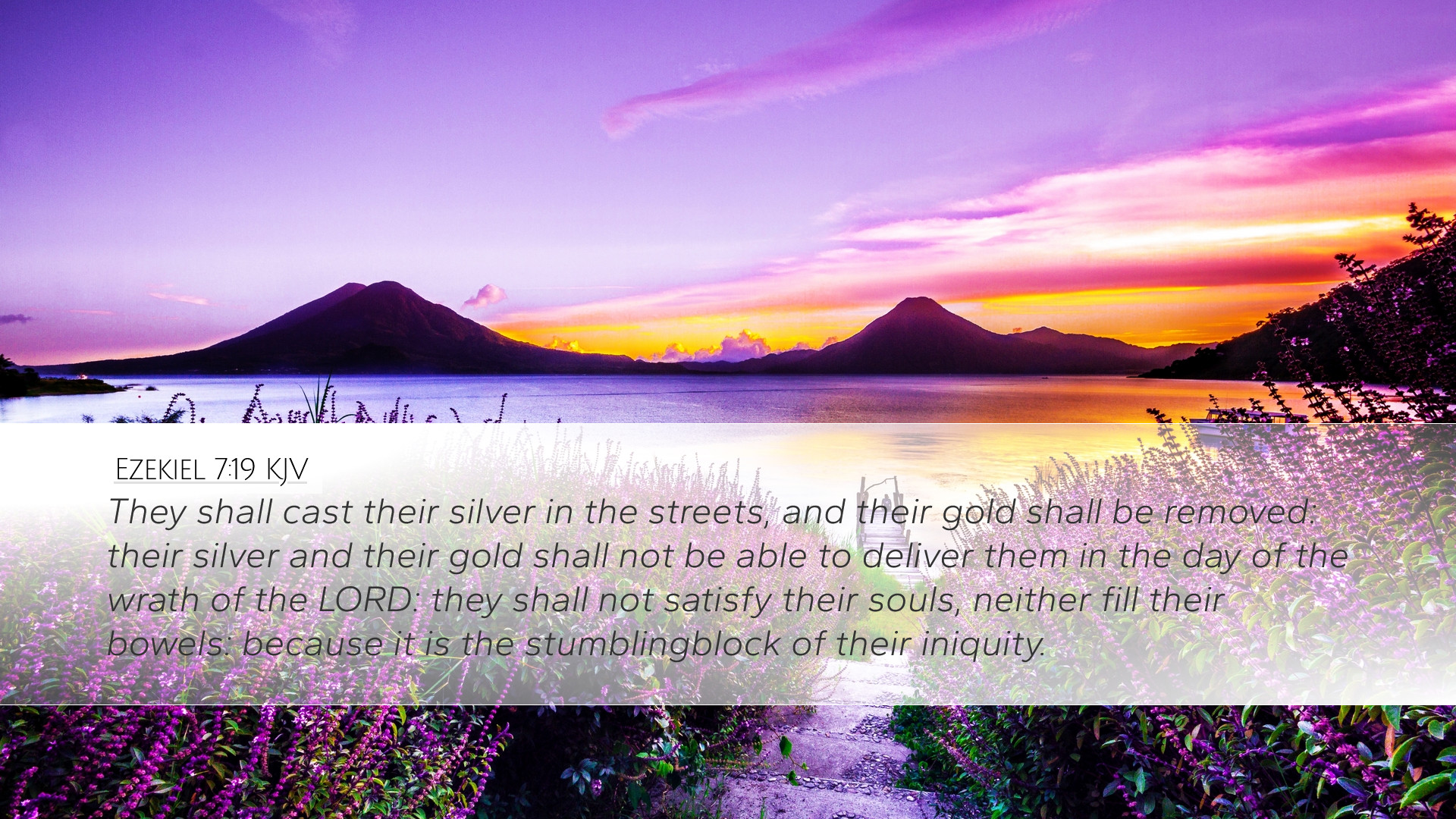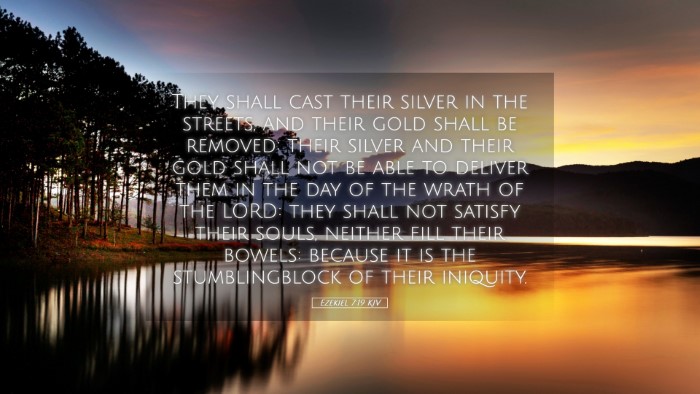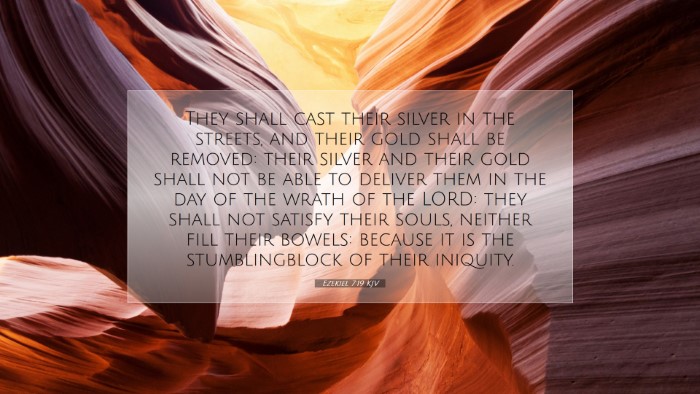Ezekiel 7:19 Commentary
Verse Text: "They shall cast their silver in the streets, and their gold shall be removed: their silver and their gold shall not be able to deliver them in the day of the wrath of the LORD: they shall not satisfy their souls, neither fill their bowels: because it is the stumblingblock of their iniquity." (Ezekiel 7:19)
Introduction
The verse Ezekiel 7:19 stands as a stark reminder of the futility of relying on material wealth during times of crisis. The prophetic voice of Ezekiel conveys a critical warning that resonates with themes of divine judgment, the impotence of riches in the face of calamity, and the deep-seated issues of idolatry. This commentary will delve into the insights presented in several public domain resources including Matthew Henry, Albert Barnes, and Adam Clarke, aiming to provide a profound understanding of this significant scripture.
Contextual Analysis
The contextual backdrop of Ezekiel's prophecy is vital for comprehension. This passage comes amidst a series of warnings about the impending destruction of Jerusalem and the judgment upon Israel for their unfaithfulness. The people had put their trust in wealth rather than in God, thus prompting Ezekiel's admonition.
- Historical Context: The Babylonian exile was imminent, and wealth that once provided security was about to be rendered meaningless.
- Thematic Insights: Judgments against idolatry, the futility of reliance on material possessions, and the ultimate sovereignty of God are prominent themes in this prophecy.
Commentary Insights
Matthew Henry’s Perspective
Matthew Henry offers a comprehensive reflection on this verse, elucidating the idea that the wealth which people have accumulated will not aid them in times of divine judgment. He states that in desperate times, all earthly support fails, and the rich are reduced to despair. Henry emphasizes the sobering reality that wealth cannot buy peace or security from the wrath of God.
- Wealth as a Stumbling Block: Henry notes that riches tied the hearts of the people away from God, illustrating how materialism can lead to spiritual blindness.
- Ultimate Loss: He articulates that the ultimate loss is not simply the wealth itself but the spiritual bankruptcy that results from misplaced trust.
Albert Barnes’ Commentary
Albert Barnes succinctly underscores the concept of judgment, remarking that gold and silver are rendered useless in the face of God's wrath. He draws attention to the foolishness of relying on riches rather than righteousness. Barnes further remarks on the contrast between spiritual wealth and material wealth, emphasizing that the former is the only true safeguard.
- The Day of the Lord: Barnes illustrates that this “day” denotes an unavoidable reckoning where no amount of wealth can avert punishment.
- Reflection on the Soul: The reference to the soul's hunger indicates that true fulfillment cannot be found in material goods, reinforcing the need for spiritual nourishment.
Adam Clarke’s Interpretation
Adam Clarke sheds light on the prophetic expression concerning the people’s misplaced priorities. He describes the casting of silver and gold in the streets as symbolic of the public recognition of their uselessness at the time of calamity. Clarke emphasizes the internal struggles faced by individuals who seek satisfaction in riches, only to find emptiness.
- Spiritual Emptiness: Clarke identifies the connection between iniquity and the pursuit of wealth, indicating that sin leads to an insatiable longing that material wealth cannot satisfy.
- Warnings to the Faithful: He encourages the faithful to acknowledge the transient nature of worldly possessions and to remain vigilant against the allure of idolatry.
Theological Implications
The implications of Ezekiel 7:19 extend beyond its immediate context, inviting reflection on contemporary applications. The emphasis on the impotence of wealth in the face of divine judgment reminds believers of the ultimate sovereignty of God over human affairs. It challenges both congregations and individuals to reevaluate their trust in wealth and worldly success.
- Idolatry of Wealth: The text stands as a caution against idolatry, as wealth becomes a substitute for faith in God.
- God’s Judgment: It serves as a sobering reminder that God’s judgments are impartial to status or wealth.
Pastoral Applications
For pastors, understanding this verse allows them to guide their congregations away from materialism and towards a deeper reliance on God. The prophetic warning against the futility of wealth is timeless and relevant, providing a basis for preaching on stewardship, where true treasure is found in faith and righteousness.
- Encouraging Generosity: Pastors can encourage their congregations to share their resources in service to the community, illustrating that true wealth lies in giving.
- Building Spiritual Resilience: Teaching about the eternal value of spiritual wealth emphasizes building resilience in faith amidst trials.
Conclusion
Ezekiel 7:19 provides a profound commentary on the inadequacy of material wealth in times of divine reckoning. The insights offered by Matthew Henry, Albert Barnes, and Adam Clarke collectively underscore the importance of prioritizing spiritual over material wealth. This scripture remains a powerful exhortation for believers to seek fulfillment not in riches, but in a vibrant relationship with God.


